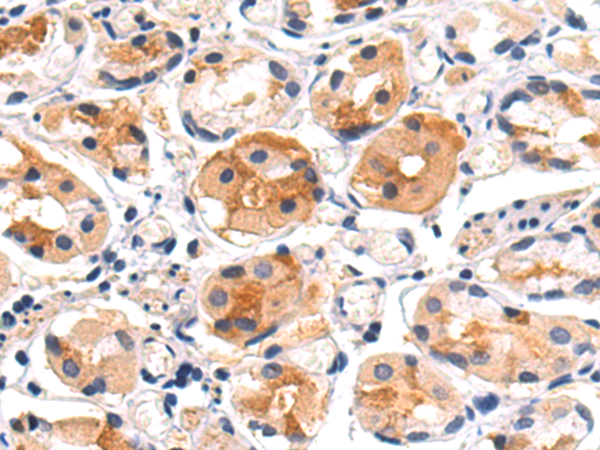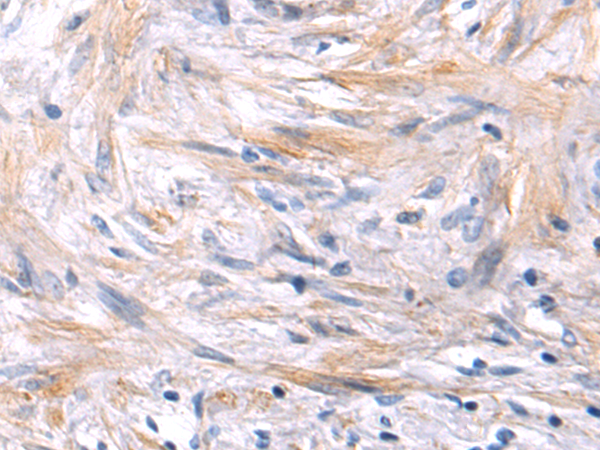

| WB | 咨询技术 | Human,Mouse,Rat |
| IF | 咨询技术 | Human,Mouse,Rat |
| IHC | 1/50-1/100 | Human,Mouse,Rat |
| ICC | 技术咨询 | Human,Mouse,Rat |
| FCM | 咨询技术 | Human,Mouse,Rat |
| Elisa | 1/5000-1/10000 | Human,Mouse,Rat |
| Aliases | SAG; GP340; SALSA; muclin |
| Host/Isotype | Rabbit IgG |
| Antibody Type | Primary antibody |
| Storage | Store at 4°C short term. Aliquot and store at -20°C long term. Avoid freeze/thaw cycles. |
| Species Reactivity | Human, Mouse, Rat |
| Immunogen | Synthetic peptide of human DMBT1 |
| Formulation | Purified antibody in PBS with 0.05% sodium azide and 50% glycerol. |
+ +
以下是关于DMBT1抗体的3篇参考文献的简要概括:
---
1. **文献名称**: *DMBT1. a novel member of the SRCR superfamily, is a candidate tumor suppressor in human malignant gliomas*
**作者**: Mollenhauer, J. et al.
**摘要**: 该研究首次报道DMBT1在恶性胶质瘤中的表达缺失,并通过抗体检测发现其与肿瘤抑制功能相关,提示DMBT1可能作为胶质瘤的生物标志物和治疗靶点。
---
2. **文献名称**: *The scavenger receptor cysteine-rich (SRCR) domain of DMBT1 is essential for its role in mucosal immunity*
**作者**: Holmskov, U. et al.
**摘要**: 研究利用DMBT1特异性抗体分析其SRCR结构域功能,发现其在先天免疫中的作用,尤其在呼吸道和肠道黏膜中通过结合病原体相关分子模式发挥保护作用。
---
3. **文献名称**: *DMBT1 expression and glycosylation patterns in lung cancer: Implications for diagnostic antibody development*
**作者**: Rosenstiel, P. et al.
**摘要**: 通过DMBT1抗体检测肺癌组织样本,发现其糖基化修饰异常与肿瘤进展相关,提出基于DMBT1抗体的新型诊断策略可能提高肺癌早期检测准确性。
---
这些文献涵盖了DMBT1在肿瘤抑制、免疫功能和临床诊断中的应用研究,抗体在其中主要用于蛋白定位、功能验证及病理分析。如需具体年份或期刊信息可进一步补充。
The DMBT1 (Deleted in Malignant Brain Tumors 1) antibody targets a protein encoded by the *DMBT1* gene, which is implicated in innate immunity, epithelial differentiation, and cancer biology. Initially identified as a tumor suppressor in brain tumors, DMBT1 is a secreted glycoprotein belonging to the scavenger receptor cysteine-rich (SRCR) superfamily. It contains multiple SRCR domains, CUB domains, and a zona pellucida (ZP) motif, enabling interactions with pathogens, immune cells, and extracellular matrix components. DMBT1 is highly expressed in mucosal tissues (e.g., salivary glands, lungs, gastrointestinal tract), where it functions as a pattern recognition receptor, binding to bacteria, viruses, and fungi to modulate immune responses.
In cancer, *DMBT1* is frequently downregulated or deleted in gliomas, colorectal, and other carcinomas, suggesting a role in tumor suppression. Paradoxically, it may also promote cancer progression in certain contexts by enhancing cell adhesion or survival. DMBT1 antibodies are vital tools for studying its localization, expression levels, and functional roles. They are used in techniques like Western blotting, immunohistochemistry, and immunofluorescence to explore its involvement in inflammation, tissue repair, and carcinogenesis. Commercial antibodies may vary in specificity (monoclonal vs. polyclonal) and epitope recognition, necessitating validation for experimental reproducibility. Research using DMBT1 antibodies continues to clarify its dual roles in homeostasis and disease, offering potential as a diagnostic biomarker or therapeutic target.
×